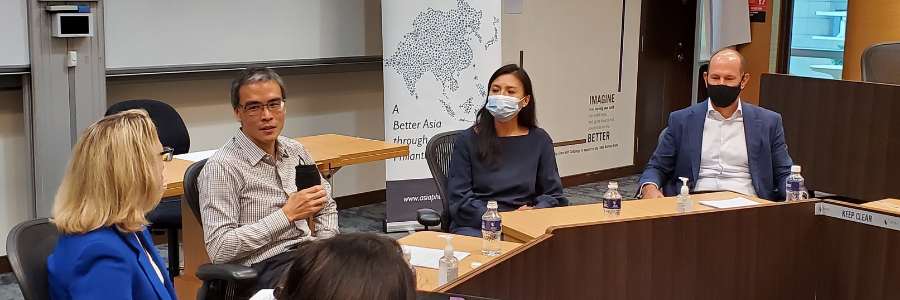BY CHAI NING
“Is there such a thing as ‘Asian Philanthropy’?” Christy Davis, Executive Director of the Lien Centre for Social Innovation (LCSI) threw this question to the panel assembled for a fireside chat examining differences and similarities between eastern and western giving. Looking at our APC members, the answer is more or less a resounding yes—but what is ‘Asian Philanthropy’? What makes it different from philanthropy in the West? What are some of the opportunities to be found and unique challenges faced by philanthropists in the region?
Panellists Laurence Lien, APC Co-Chair and Co-Founder, Pierre Lorinet, Chairman of the Lorinet Foundation and APC member, and Susan Sy, Executive Director of Client & Philanthropy Services at UBS, sat down with a hybrid audience of over 100 members in- person and tuning in virtually to discuss these questions. The conversation drew on a report on barriers and enablers in Asian philanthropy published by LCSI in November 2020.
Philanthropy is culturally and contextually different in Asia from the West, including the strong emotional affinity that drives giving, different relationship with government and role of philanthropy in advocacy. Evidence-based giving was discussed as being relatively nascent in Asia, although this is changing as philanthropic entities pass the reins to NextGen members, who are increasingly impact-driven, looking towards innovative financing models and internationalising their giving.
One major theme that emerged from the discussion was that of collaboration and its challenging nature yet immense importance in the region. Collaboration brings about greater collective impact, helps stress-test ideas by bringing together diverse perspectives, increases negotiating power and allows philanthropists to leverage on each other’s successes. Panellists also agreed that collaboration was difficult and “unnatural”, with philanthropists valuing independence in decision-making, and that it was essential to find partners who shared similar values, philosophies and goals and to start small and view collaboration as an on-going learning process.
Part of this process was, as panellists discussed, professionalising philanthropy practitioners and building capacity within the sector, in order to strengthen the ecosystem within which Asian philanthropy resides. As Asian philanthropy continues to grow and evolve, it will need to be supported by trained professionals, as well as social sector actors such as intermediaries, NGOs and governments in order to continue doing meaningful good for the region.
Members can view the full session recording of the livestream event here, as well as read the full report “Giving and Receiving: A Study of Barriers and Enablers in Asian Philanthropy” published by LCSI here.

